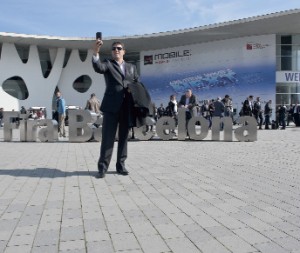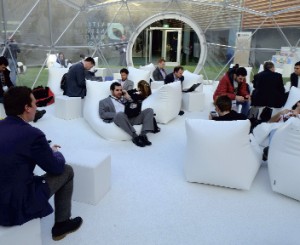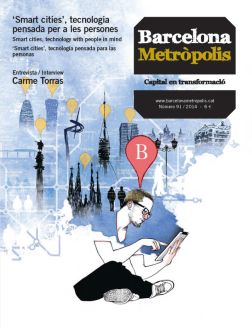
© Albert Armengol
Image of the edition of the Mobile World Congress, held in Barcelona in February 2014.
We are living in changing times. The Concert of Nations is giving way to a new world where cities are becoming the axes of a knowledge economy. On this map of emerging smart cities, Barcelona is there squarely on its own merits and, on top of that, it is demonstrating a highly favourable and exciting ability to lead the way.
Mobile World Capital and, since very recently, the European Capital of Innovation, Barcelona now holds fourth place in the 2013 Smart City rankings and stands out as an example of good practice in smart urban matters, ahead of cities like Paris, London and Stockholm. Barcelona is also heading up the City Protocol Society, whose role is to agree upon recommendations and standards to be shared by all the urban communities across the world. In recent years the city has also become a global benchmark for its drive and innovative capacity, as well as on other issues.
It is a paradox that we are in agreement on calling the cities of the future “smart cities” when we are not yet fully aware of the scope of the change the digital revolution will entail, undoubtedly because these changes are taking place so rapidly. However, at the end of the day, so-called smart policies only seek to intensify the collective intelligence that cities have always had in a new technological paradigm aimed at improving quality of life.

© Vicente Zambrano
Image of the edition of the Mobile World Congress, held in Barcelona in February 2014.
In this new issue of Barcelona Metròpolis we look at the smart policies that are being deployed in the city, from apps to the fields of health, transport and culture. The implementation of these new technologies affects the environment, infrastructure, buildings, public spaces and information flow. But technological intelligence, which only makes sense if it benefits people and makes life easier, is only part of the intelligence we need.
It falls on the local authority to think, act and manage the city with intelligence, and, of course, the public must demand this. At the same time, this insistence entails sharing responsibility in many of society’s individual behaviours: recycling, energy efficiency, responsible consumption, etc. Responsible technology and management – both public and private – must be part of the virtuous circle that will enable us to reach new heights of progress.
The symbiotic capacity of Barcelona people, their inveterate willingness to cooperate and participate, is one of the great values that makes our desire to be a smart city a realistic possibility. A smart city in capital letters, in all senses.



